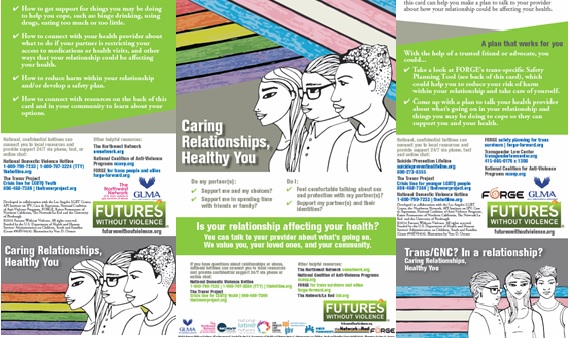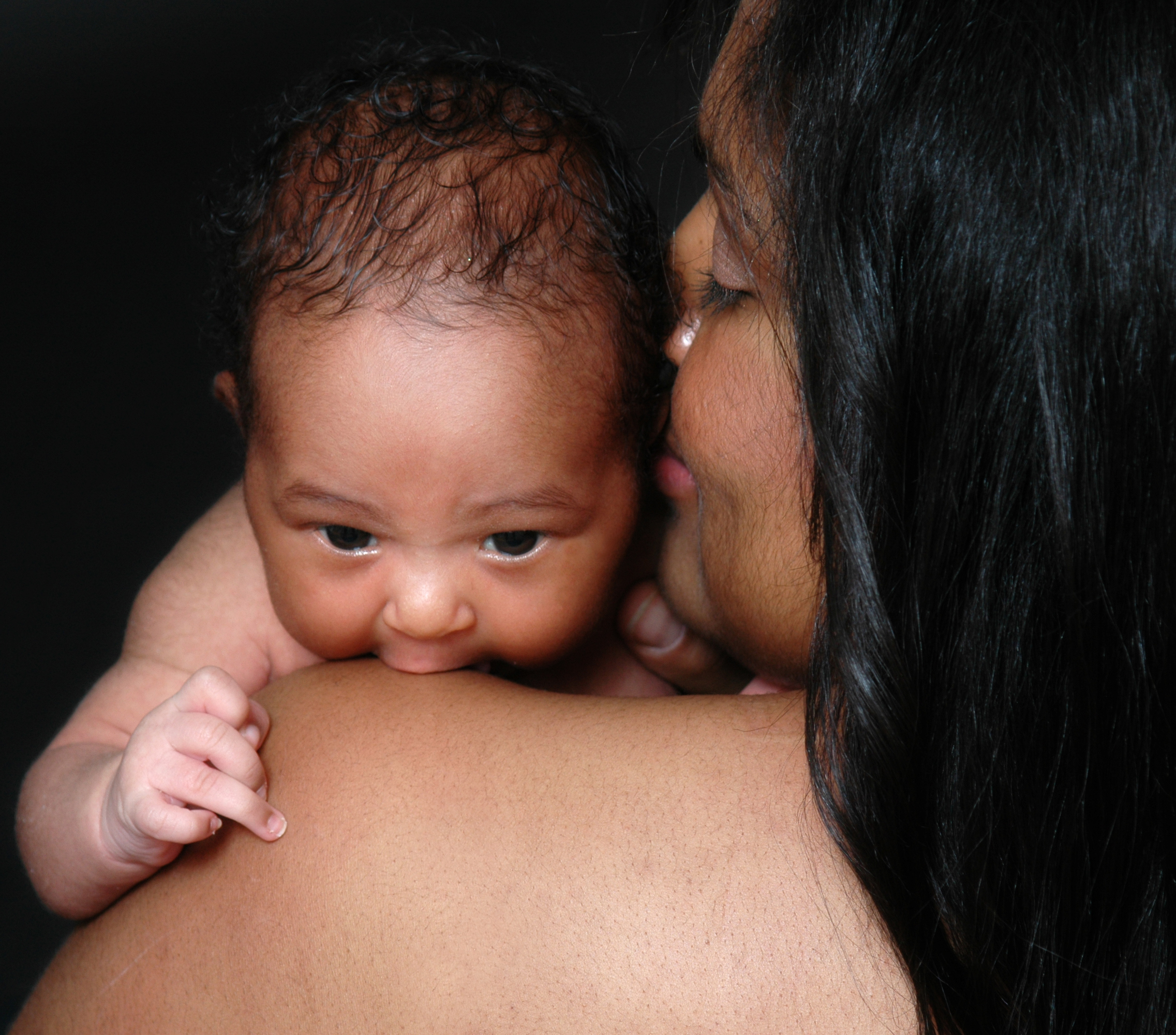Lesbian, Gay, Bisexual, Trans/GNC, and Queer IPV
- FUTURES LGBTQ Intimate Partner Violence Materials
- How to use the Safety Card and Poster
- Quick Tips for LGBTQ Inclusive Health Settings
- LGBTQ Health and Ally Resources
.
FUTURES LGBTQ Intimate Partner Violence Materials
With the help of the Los Angeles LGBT Center, National Coalition for Anti-Violence Programs, FORGE, The Northwest Network, Kaiser Permanente of Northern California, Casa de Esperanza – National Latin@ Network, Community United Against Violence (CUAV), Asian Pacific Islander Institute on Gender Based Violence, The Network/La Red, and the University of Pittsburgh, Futures Without Violence has developed new materials that are specifically for Lesbian, Gay, Bisexual, Queer and Trans/Gender-non-conforming people.
The Caring Relationships, Healthy You safety cards and poster are survivor-centered tools that are useful conversation starters for health care providers who are doing universal education around healthy relationships and assessing for intimate partner violence.
Because queer and trans people experience violence at similar, and in some instances higher rates, it is critical that healthcare and other providers ensure that their practice is culturally inclusive for queer and trans people and that they are talking to all of their patients about the effects that intimate partner violence can have on health. Want more information about the serious long term health impacts of violence? Get the facts.
Resources
Download and order the materials on our online store. The following resources are available in both English and Spanish:

.
How to use the Safety Card and Poster
Though it can be difficult for providers to talk to their patients about intimate partner violence, these safety cards can make the conversation easier!
Open up the card with your patient/client/etc.:
“I give a couple of these cards to all of my patients. It talks about healthy relationships, and how relationships can affect your health.”
Give every patient two cards. This evidence based intervention showed that when patients were given two cards, they were more likely to share one with a friend or family member who needed it.
Disclose limits of confidentiality.
“If you wanted to talk to me about things that are going on in your relationship, know that that is confidential, unless you tell me about an instance of child abuse or if you are going to hurt yourself or someone else.” (This will depend on state, see Compendium of State Statutes).
Direct assessment:
“As you can see, it is kind of like a magazine quiz. Do you ever have concerns about how you’re being treated in your relationship(s)? Or about how your relationship(s) might be affecting or interfering with your health?”
Disclosure is not the goal, but it does happen. Make sure that you respond to disclosures of violence in a supportive way:
“I am sorry this is happening.” “Thank you for sharing this with me, it is very brave of you.”
Explain what’s on the back of the card:
“On the back of the card, there are numbers and websites that have more information, should you ever need support around your relationship.”
Go the extra mile:
“Also, I can always connect you with someone over at [local DV organization, LGBTQ support organization, etc.] if your interested in talking with someone. If you want to talk to someone today, you’re welcome to use the office phone.”
Order more cards when you run out, for free from our online store.
For additional information on how to use safety cards along with scripts and tips for responding to disclosures of violence, take a look at our primary care toolkit, training vignettes and this webinar. Learn more about the CUES intervention.
.
Quick Tips for Having A More LGBTQ Inclusive Health Setting and Practice
- Create a welcoming setting and environment with visual cues.
- Include a space for the name patients want to be called on intake forms and use last names to call people in from the waiting room.
- Share your pronouns with all patients and ask your patients what pronouns they use.
- Do not make assumptions about the gender of your patients’ partner(s), use gender neutral terms when referring to patients partner(s) such as “they”.
- Patients may not identify as LGBTQ or come out to you, and that’s okay!
- Familiarize yourself with local and national LGBTQ-specific resources and find out what anti-violence services are accessible for IPV survivors of all genders, not just cisgender women.
- Recognize that abuse happens in queer relationships, and that the health setting should be a place where people who have survived and used violence can seek support.
.
LGBTQ Health and Ally Resources
There are many resources for provides and clinics that are working to be more inclusive for LGBTQ people. The National LGBT Health Education Center at Fenway Institute is a great place to start:
The National LGBT Health Education Center
The National LGBT Health Education Center provides educational programs, resources, and consultation to health care organizations with the goal of optimizing quality, cost-effective health care for lesbian, gay, bisexual, and transgender (LGBT) people. Interactive features like learning modules and webinars can also be found on the website. The Education Center is a part of The Fenway Institute, the research, training, and health policy division of Fenway Health, a Federally Qualified Health Center, and one of the world’s largest LGBT-focused health centers.
The Fenway Guide to Lesbian, Gay, Bi-sexual, and Transgender Health Second Edition
The Fenway Guide to Lesbian, Gay, Bisexual, and Transgender Health, 2nd edition is a must-have resource for clinicians, students, and researchers working in hospitals, clinics, universities, libraries, and private practices in every community.
The select resource and research in the National Online Resource Center on Violence Against Women (VAWANet) Special Collection illustrate the LGBTQ communities’ experiences with domestic violence within the U.S. Resources especially relevant to these individuals, as well as straight allies and professionals, address the issue of domestic violence in LGBTQ communities, relationships, and the impact on society. Guidance for enhancing culturally specific practice and policy initiatives is provided.
Through safety planning, friends, family, advocates, and concerned professionals can help victims understand that these beliefs are dangerous myths and help the victim focus on where they/ze/he/she actually does have power and control: planning for and taking concrete actions that can enhance their/zir/his/her safety. Use this comprehensive planning too by FORGE to learn more about the issue and create an effective safety plan.
Thank you to our partners and contributors!
Los Angeles LGBT Center, the Northwest Network, FORGE, API Institute on IPV, Casa de Esperanza/National Latin@Network, National Coalition of Anti-Violence Programs, Kaiser Permanente of Northern California, The Network/La Red, the University of Pittsburgh, The Gay and Lesbian Medical Association, Community United Against Violence, Layal Camargo, Essex Lordes, and Vero D. Orozco.





